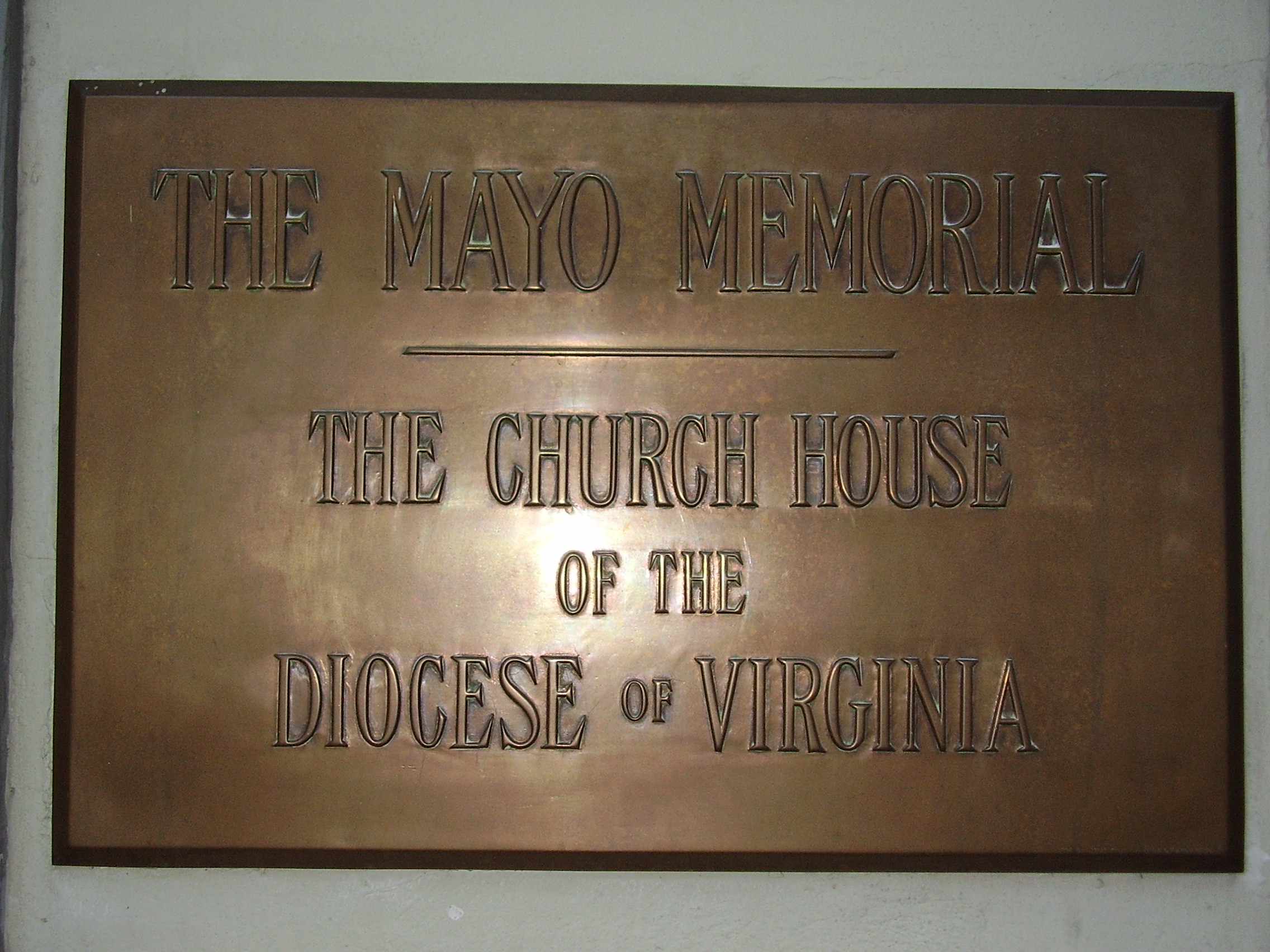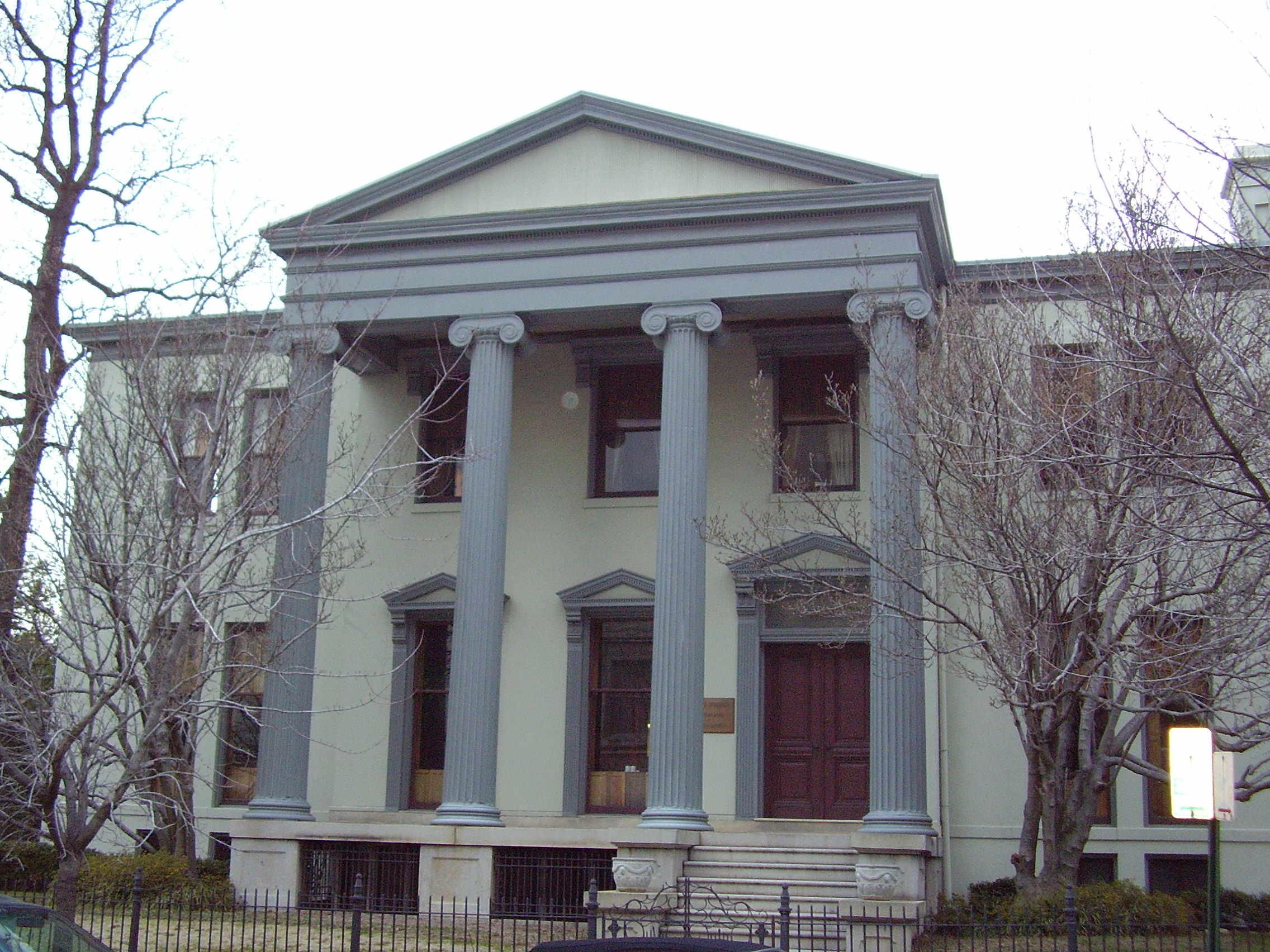The Episcopal Diocese of Virginia
In 1841 the entire square between Franklin and Grace, Jefferson and Adams Street was purchased by Samuel Taylor. At the time the only house on the block was the house built by Alexander Stuart, which in recent years became known as the Barksdale house. In 1845 Taylor built a much larger house at the western end of the property which he gave to his son William F. Taylor as a residence and willed to him when he died. The Taylors owned this house until 1872 when it was then purchased by Walter K. Martin, senior member of the wholesale commission house bearing his name. Walter Martin owned the property and lived there until 1883 when he sold it to Peter H. Mayo.
 Mr. Mayo was a Richmond businessman who latter became one of the wealthiest men in Richmond and is largely responsible for the founding of All Saints Church. When Mr. Mayo inhabited the house the architecture was Victorian. The house looked very similar to the contemporary Joseph R. Anderson house across the street, with low one story wings on either side and a detached kitchen and laundry in the rear.
Mr. Mayo was a Richmond businessman who latter became one of the wealthiest men in Richmond and is largely responsible for the founding of All Saints Church. When Mr. Mayo inhabited the house the architecture was Victorian. The house looked very similar to the contemporary Joseph R. Anderson house across the street, with low one story wings on either side and a detached kitchen and laundry in the rear.
In 1884 the outbuilding was replaced by a long addition on Jefferson Street, the original wings were raised to two stories, and the large window panes were replaced with smaller ones. The inside of the building was refurbished with polished hardwoods. The parlors, library and dining rooms were all finished in mahogany and the main stairway in quartered oak. The bathrooms and pantry were furnished in cherry and walnut. In 1923 Mr. Mayo’s daughters, Mrs. Benehan Cameron and Mrs. Thomas N. Carter, donated their father’s home to the Episcopal Diocese of Virginia to serve as the center of church activities. The house is now know as Mayo Memorial Church House and serves as the Episcopal Dioceses administrative center. (Descriptions of positions and staff can be found on the dioceses website at http://www.thediocese.net/diocese/staff.shtml)
 The Virginia Diocese (representing the 90,000 people and 193 church communities) have directed the Mayo House staff to orient program, mission and ministry resources to five priorities: strengthening existing churches, planting new churches, expanding ministry to youth, reaching out to neighbors in need, and enhancing retreat and conference centers as places of rest and refreshment for the ministries of the church.
The Virginia Diocese (representing the 90,000 people and 193 church communities) have directed the Mayo House staff to orient program, mission and ministry resources to five priorities: strengthening existing churches, planting new churches, expanding ministry to youth, reaching out to neighbors in need, and enhancing retreat and conference centers as places of rest and refreshment for the ministries of the church.
The Diocese is strengthening existing churches with its Mountain Missions, Small Church Institute, and the Unexpected Expenses for Congregational Missions programs. These are backed by program committees, the Committee on Race Relations, the Committee on Stewardship of Creation, the Committee on Education, and the Commission on Congregational Development. The Diocese is also strengthening existing churches through the Canonical Missions. The diocese assists missions with direct financial aid through the Commission on Congregation Missions (CCM), a volunteer commission of lay and clerical members. With this aid the Diocese is assisting congregations that could not otherwise support a priest or that are experiencing financial difficulty.
The Diocese is strengthening new churches through the New Missions Budget, and the Commission of Church Planting. The development of youth services is strengthened through the Committee on Parish Youth Ministries (PYM), Youth Ministries Development, Shrine Mont Scholarship Program, the Committee on Ministries in Higher Education, the Robert Bruce Hall Diocesan Scholars Program, and Grants for Ministries in Higher Education. The Diocese is enhancing its retreat centers by improving the facilities and programs that they offer.
Other priorities for the Diocese include raising up Lay and Ordained Leaders by the Commission on Ministry (COM), Postulancy Interviews, Formation Retreat, Candidacy Interviews, Mid-Atlantic Parish Training Program, General Ordination Examinations, Diaconal Interviews, Ordination Expenses, Diaconal Compensation, Committee on Women in Mission and Ministry, Education for Ministry, Young Priests Initiative, Commission on Professional Standards and Support, and the Diocesan Spiritual Discernment.
Diocese outreach activities are organized through three programs: the Diocesan Fund for Human Need, the Diocesan Fund for World Mission, and the Mustard Seed Fund created by the Firth Century Fund. Each of these programs awards grants to congregations in support of the specific outreach program. In addition to these programs, the Diocese also supports Ecumenical Partnerships; the Chaplain Service of the Churches of Virginia, Inc.; the Refugee Resettlement Program; the Virginia Council of Churches, and the Virginia Interfaith Center for Public Policy.
In addition to the variety of programs carried out through local parishes, several other program committees have been established: the Committee on Aging, the Committee on Mental Health, the Task Force on Parish Nursing, the Task Force on Prisoner Ministry, the Commission on World Mission, the Commission on South African Partnership, and the Commission on Addiction and Recovery.
Mayo Memorial Church House
101 West Franklin Street
Richmond VA 23220
(804)-643-8451
Sources:
The Episcopal Diocese of Virginia website at http://www.thediocese.net/r
The Diocese of Virginia. So Much to be Done as One, Stories of Our Shared Ministry.
Profile prepared by Laura K. Palin
February, 2007
